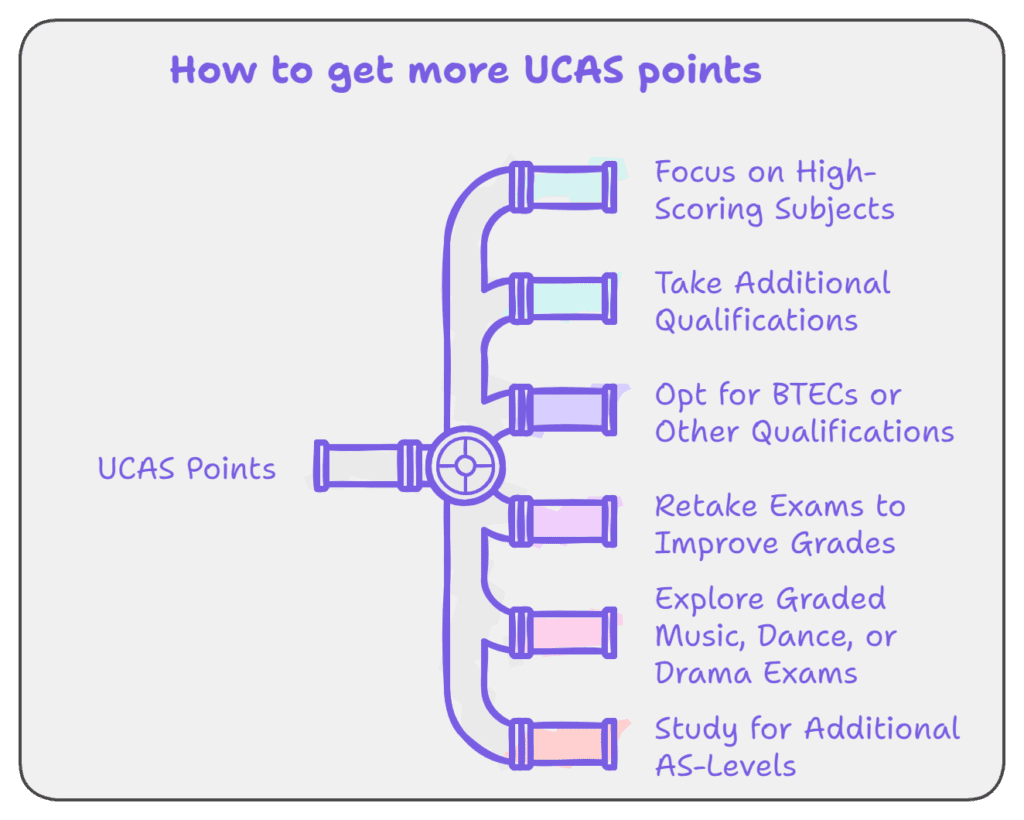UCAS points play a major role in university applications. They help universities assess your qualifications and decide on your admission. If you don’t know what UCAS points are or how to calculate them, you’ve come to the right place.
This guide covers the basics, including the UCAS Tariff system and which qualifications count. We’ll also share strategies to boost your points by choosing high-value subjects or taking additional qualifications. Whether you’re preparing for A-levels, BTECs, or other courses, this guide will help you maximise your points and increase your chances of admission.

What Are UCAS Points?
UCAS points standardise the assessment of a student’s academic qualifications in the UK. UCAS, or the Universities and Colleges Admissions Service, developed this system to simplify the university application process. The points help universities measure and compare applicants with different types of qualifications.
Each qualification, such as A-levels, BTECs, and the International Baccalaureate, carries a specific number of UCAS points based on the grade you achieve. Higher grades earn more points. For example, an A* in A-level may be worth more UCAS points than a C grade in the same subject. Similarly, different qualifications offer different points. A full BTEC diploma might provide more UCAS points than a single AS-level subject.
Not all qualifications contribute to UCAS points. For instance, GCSEs do not count towards UCAS points. However, other qualifications, such as Scottish Highers and certain music or dance exams, do.
Universities use UCAS points as part of their entry requirements. Some universities require a certain number of points for admission, while others focus only on specific subjects or grades. This flexibility helps students from different educational backgrounds compete fairly.
To calculate UCAS points, students can use the UCAS Tariff Calculator on the UCAS website. This tool allows students to enter their qualifications and grades to see the total UCAS points they have earned.
How Do UCAS Points Work?
UCAS points serve as a way for universities in the UK to evaluate and compare students’ academic achievements across different qualifications. The UCAS points system assigns a specific value to each qualification and grade, which helps standardise a student’s achievements. This system is called the UCAS Tariff.
Not all qualifications contribute to UCAS points. For instance, GCSEs do not count towards UCAS points, meaning do GCSEs give UCAS points? Or does GCSE count for UCAS points? – The answer is no. However, other qualifications, such as Scottish Highers and certain music or dance exams, do contribute.
Here’s a breakdown of how UCAS points are typically calculated:
- Grades and Their Values: Each grade in a qualification (e.g., A*, A, B, etc.) has a specific UCAS point value. For example, an A* at A-level may be worth 56 points, while a B grade might be worth 40 points. This allows different grades within the same qualification to have varying UCAS points.
- Qualification Type: Different qualifications carry different maximum points. A full A-level course usually has more points than an AS-level, and a BTEC Extended Diploma may have more points than a single A-level.
- Level of Qualification: The points system also considers the level of each qualification. Higher qualifications, such as Advanced Highers in Scotland or the International Baccalaureate, generally provide more UCAS points.
- Additional Qualifications: Some qualifications, like the Extended Project Qualification (EPQ), can add extra points. This allows students to gain more points by taking on additional, optional studies.
Once you’ve calculated your points, you can compare your total with the requirements set by universities. Universities may specify a certain number of UCAS points as part of their entry requirements. For example, a course might require 120 UCAS points from specific subjects or any relevant qualification. Some universities use UCAS points in combination with specific subject requirements, such as needing a certain grade in Maths or Science, alongside a total point requirement.
Tips to Gain UCAS Points

1. Focus on High-Scoring Subjects
Selecting subjects where you can achieve high grades is one of the most effective ways to increase your UCAS points. For instance, an A* at A-level can earn you 56 points, while a B is worth 40 points. Choose subjects that align with your strengths and academic interests, and put extra effort into securing top grades. Strong subject choices and high scores can make a substantial difference to your UCAS point total.
2. Take Additional Qualifications
If available, consider completing the Extended Project Qualification (EPQ). This research-based project, which allows you to delve deeply into a topic of your choice, can earn you up to 28 extra points if you achieve an A*. Beyond the points boost, many universities appreciate the EPQ as it demonstrates independent study skills and self-motivation, which can strengthen your application overall.
3. Opt for BTECs or Other Qualifications
BTECs are an excellent alternative for students who prefer a coursework-heavy curriculum over exams. BTEC Extended Diplomas, Diplomas, and Certificates carry substantial UCAS points, equivalent to A-levels at certain levels. In addition to BTECs, other qualifications, such as Cambridge Pre-U, Scottish Highers, or the International Baccalaureate, are recognised by UCAS and can contribute to your points, providing more options to suit your learning style.
4. Retake Exams to Improve Grades
If you have an opportunity to retake exams, improving a grade can result in more UCAS points. For instance, moving from a B to an A in an A-level subject increases your points by 16. Consider retakes if you believe you can raise your grade with extra preparation. Retakes not only enhance your UCAS points but also reflect a commitment to improvement, which is viewed positively by admissions officers.
5. Explore Graded Music, Dance, or Drama Exams
Extracurricular achievements, like graded exams in music, dance, or drama, are also eligible for UCAS points. Accredited boards like ABRSM, Trinity College, or RAD offer graded exams, with Grades 6, 7, and 8 contributing UCAS points similar to those earned from AS and A-level subjects. These activities showcase talent, dedication, and discipline, providing an extra edge on your application while adding points.
6. Study for Additional AS-Levels
Taking an extra AS-level is a great way to add UCAS points without the time commitment of a full A-level. AS-level subjects carry points in the UCAS Tariff, with top grades offering a solid boost to your total. If your schedule allows, choosing an AS-level that complements your main subjects can both enhance your points and expand your knowledge base.
7. Consider Online or Evening Courses
Some schools or learning centres offer evening or online A-level or BTEC courses, allowing you to take on additional studies outside regular school hours. An extra qualification achieved this way can increase your UCAS points if your schedule allows for the added commitment. Look into flexible course providers to explore options for expanding your qualifications.
8. Check for University-Specific Bonus Points
Some universities award additional consideration for qualifications like the EPQ or specific high school achievements. Even if you don’t need UCAS points directly, universities may view these additional qualifications favourably, and they could even lower entry requirements. Research the institutions you’re interested in to see if they recognise these qualifications for bonus points or extra consideration.

Get Additional Help From Tutors
Maximising UCAS points can be challenging, especially when aiming for high grades across multiple subjects. At Edumentors, we connect students with experienced tutors from top UK universities who can provide the targeted support needed to achieve academic goals. A tutor can help you strengthen subject knowledge, boost confidence, and improve study techniques, which all contribute to better grades and, ultimately, more UCAS points.
FAQs
Do all qualifications carry UCAS points?
No, not all qualifications are assigned UCAS points. While many Level 3 qualifications like A-levels, BTECs, and the International Baccalaureate have UCAS Tariff values, others, such as GCSEs, do not. It’s important to check whether your specific qualifications are included in the UCAS Tariff.
Can extracurricular activities contribute to UCAS points?
Certain extracurricular qualifications, such as graded music, dance, or drama exams at Grade 6 or above, can contribute to UCAS points. However, general extracurricular activities without formal qualifications do not carry UCAS points.
Do universities prefer UCAS points or specific grades?
Some universities specify entry requirements in terms of UCAS points, while others prefer specific grades in certain subjects. It’s crucial to check the specific entry requirements for each course and university to understand their preferences.
Can vocational qualifications contribute to UCAS points?
Yes, vocational qualifications such as BTECs and T-levels are assigned UCAS points and can contribute to your total. The number of points depends on the qualification type and the grades achieved.








